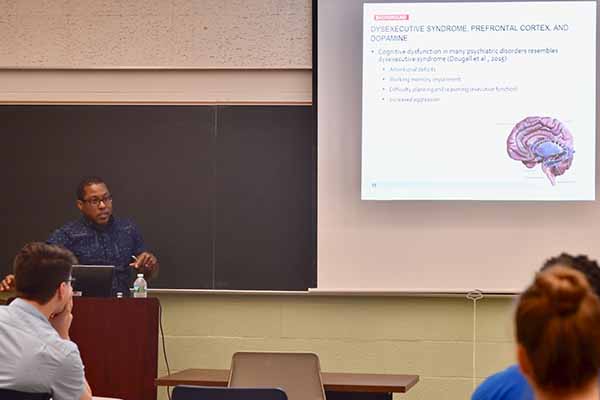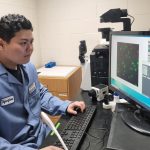Synopsis of the 2019 Summer Seminar Series
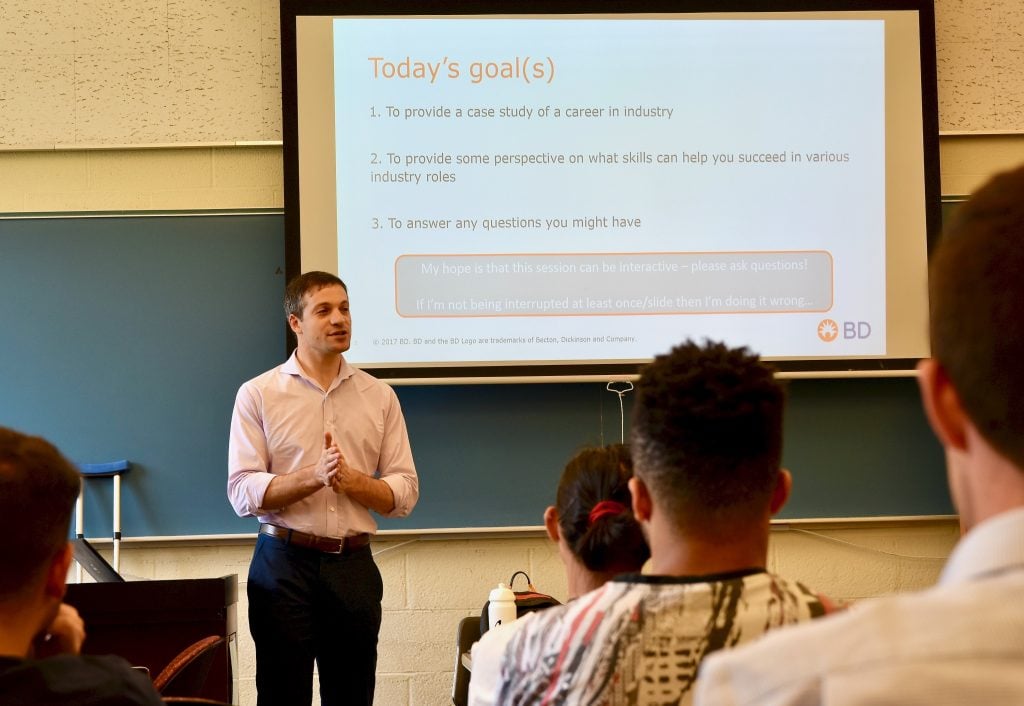
To facilitate learning and exposure to various research fields, INBT and the Physical Sciences-Oncology Center (PS-OC) hosts a seminar series every summer with experts in areas of nanoscience, medicine, and engineering. Organized by INBT PhD candidates, Franklyn Hall and Kai Yao, the 2019 series welcomed eight guest speakers across the Johns Hopkins community, the University of Maryland, and Becton Dickinson.
The seminar series is a place for researchers to share knowledge and experience with their community. Through this sharing, it facilitates and atmosphere where professionals can network with professionals, build collaborations, and gain new knowledge to use in their own work.
David Sebba, PhD, Becton Dickinson (BD)
Developing a Career in Industry
Dave Sebba is an Associate Principal Scientist, R&D Innovation at BD’s Diagnostic Systems business. Dave partners with Business Development, R&D, and business leaders to identify and assess new technologies and business opportunities and set strategic priorities.
Careers are not always linear, and David’s presentation provided case studies for a career in industry along with similarities and differences between an academic career and industry career. In his interactive session, he provided a perspective on what skills can help one succeed in various industry roles. These skills include both hard, technical skills, such as knowing how to operate laboratory equipment and carry out experiments, but also soft skills, such as working with customers and your colleagues.
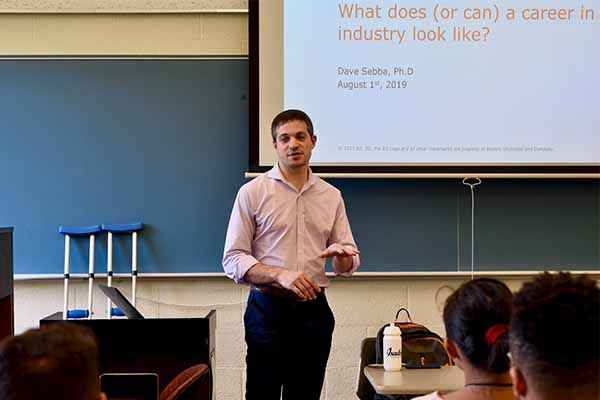

Warren Grayson, PhD, Department of Biomedical Engineering, Johns Hopkins University
Traveling the Long Road to Clinical Translation of Tissue Engineered Bone Grafts
Treating large craniofacial bone loss due to congenital defects, trauma, or cancer resection remains a huge clinical challenge. Approximately 200,000 fractures require bone transplantation annually in the US at the cost of $2B. Tissue engineering, where the patient’s own cells are combined with porous scaffolds to guide their development into new bone tissue, provides a viable means of obtaining ‘autologous’ bone grafts for the treatment of large bone defects. Successfully applying tissue-engineered grafts, however, requires overcoming key scientific, regulatory, and practical hurdles. To address these, Warren Grayson’s lab has focused on the development of a point-of-care stem cell-biomaterial based strategy for treating massive craniomaxillofacial bone loss.
In his talk, Warren Grayson outlined novel technologies and strategies they are developing to advance the bone tissue engineering field with consideration for the regulatory and practical concerns. He also described ongoing studies intended to move us closer to realizing human clinical trials.
Learn more about their research on their lab website and Twitter.
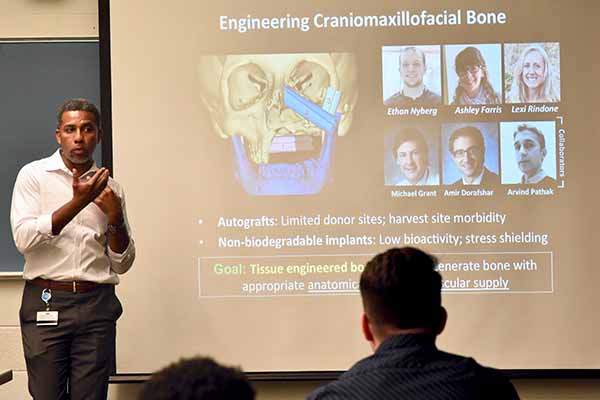
Christopher Jewell, PhD, Fischell Department of Bioengineering, University of Maryland
Harnessing Biomaterials to Study and Control the Immune System
Jewell’s research combines immunology and biomaterials to understand the interactions between synthetic materials and immune tissues, and to design more selective therapeutic vaccines for cancer and autoimmunity.
Jewell discussed new degradable polymer depots that could improve the selectivity of therapies for autoimmune diseases such as multiple sclerosis and diabetes by locally reprogramming the function of lymph nodes – tissues that coordinate immune function. Jewell also discussed self-assemble immune signals into modular nanostructures.
Learn more about their research from their lab website and Twitter.
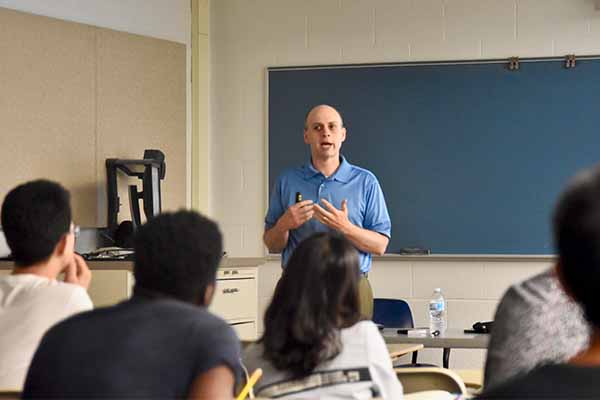
Michael Tsapatsis, PhD, Department of Chemical and Biomolecular Engineering, Johns Hopkins University
Molecular Sieve Catalysts and Membranes
Zeolites are microporous framework silicates that are used widely in the chemical industry as heterogeneous acid catalysts, efficient ion exchangers, selective adsorbents for gas separations and as perm-selective dehydration membranes. They are also useful in other applications like water softening, as desiccants, and for adsorptive/catalytic treatment of automotive emissions. Zeolites have a wide range of compositions. Tsapatsis focused his talk on pure silica zeolites (zeosils) and high silica zeolites, i.e., zeolites with large ratio of silicon to substituents like Al, B, Ge, Sn, Ti that isomorphously replace silicon in the tetrahedral sites of the zeolite framework.
Michael Tsapatsis’ research group and collaborators have devoted more than two decades to study zeolite nucleation and crystal growth in efforts to create (i) nanometer-thin, oriented, and pinhole-free separation membranes, and (ii) hierarchical porous adsorbents and catalysts.

Jamie Spangler, PhD, Department of Biomedical Engineering, Johns Hopkins University
Reshaping the Immune Response Through Molecular Engineering
The repertoire of naturally occurring proteins is limited and many molecules induce multiple conflicting effects. Protein engineering affords researchers the unprecedented capacity to create new molecules with novel and therapeutically useful activities.
Researchers have traditionally taken an unbiased approach to protein engineering, but as our knowledge of protein structure-function relationships advances, we have the exciting opportunity to apply molecular principles to guide engineering.
Leveraging cutting-edge tools and exclusive expertise in structural biology and molecular design, the Spangler lab implements a unique structure-based engineering approach to elucidate the determinants of protein activity and inform drug development. Building on molecular insights, our group aims to redesign existing proteins and engineer new proteins to serve as targeted therapeutics to treat immune diseases such as cancer, infectious diseases, and autoimmune disorders.
Learn more about their research on their lab website and Twitter.

Gregory Carr, PhD, Department of Pharmacology and Molecular Sciences, Johns Hopkins Medicine
Development of Novel COMT Inhibitors for the Treatment of Cognitive Impairment Associated with Schizophrenia
Cognitive impairment is a core feature of many psychiatric and neurological disorders. Currently, available therapies do not significantly improve cognitive impairment. Tolcapone, a COMT inhibitor, is an approved treatment for the motor symptoms of Parkinson’s disease, but it has multiple features that prevent its widespread use as a cognitive enhancer.
Carr’s team developed non-nitrocatechol, COMT inhibitors with improved PK and safety profiles compared to tolcapone. He described multiple novel compounds with promising preclinical in vivo profiles that may be suitable for clinical trials testing their cognitive enhancement capabilities.
Learn more about their research.
